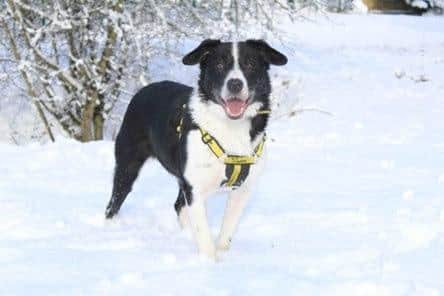The big freeze: Sussex dog owners given firm warning amid freezing temperatures
and live on Freeview channel 276
After the Met Office issued cold weather alerts across the country – amid ‘the big freeze’ – the UK’s largest dog welfare, Dogs Trust, issued its own warning, advising owners to keep their dogs away from ice.
“Many dogs love to swim but with these freezing temperatures, they may find their usual spot frozen over,” a spokesperson for the charity said.
Advertisement
Hide AdAdvertisement
Hide Ad"While it might be tempting to let them run on this ice, Dogs Trust is warning that this could be dangerous for both dogs and owners alike. The ice may not be thick enough to take your dog’s weight, and they could fall through into the freezing water underneath.”


The charity strongly advises that, if your dog does fall through the ice, you ‘should never be tempted to go in after them’.
The spokesperson added: “While it may be hard to resist the instinct to save your dog, the effects of cold water shock on people can be fatal.
"It can cause heart attacks, even in the relatively young and healthy, and the involuntary gasps and panic caused by sudden immersion in cold water can increase the chance of inhaling water directly into the lungs.
Advertisement
Hide AdAdvertisement
Hide Ad"You could also inadvertently put your dog at more risk as anyone who may be able to help, such as the fire service, will prioritise your rescue over the safety of your dog.”
People are instead urged to ‘encourage your dog to swim back to you’, and ‘if you need help in an emergency, call 999’.
Jenna Kiddie, head of canine behaviour at Dogs Trust said: “Temperatures have dropped significantly over the last few days, and many ponds and lakes have frozen over. While these might provide tempting opportunities for your dog to explore, ice can be incredibly dangerous for both you and your dog.
“If you are walking your dog anywhere near a frozen lake or pond, keep them on a lead. If your dog does fall through the ice, don’t enter the water to save them as this could lead to you requiring an emergency rescue, and could cause you serious harm.”
Advertisement
Hide AdAdvertisement
Hide AdIce is not the only risk facing dogs and their owners in this weather. To help ensure dogs remain healthy and happy, the nation’s largest dog welfare charity has published some guidance:
– Stay warm: “Dogs feel the cold just like we do, so it is important to keep them warm. Some breeds grow thick furry coats all year round, so, as the weather gets colder, consider letting your dog's fur grow longer to give them added protection. Some shorter-haired pooches and puppies may need a little bit of help staying warm, so consider buying them a sensible winter coat. Wearing a coat is a new experience for some dogs and needs to be introduced in a gradual and positive way.”
– Keep your dog on the lead: “Snow can be disorientating for dogs, and they can become easily lost in it. Make sure your dog is wearing a collar and ID tag, and their microchip details are up to date.”
– Wipe after walking: “Make sure you wipe your dog’s legs, feet and stomach after a walk, as grit from the roads and dampness from rain or snow can irritate their skin.”
Advertisement
Hide AdAdvertisement
Hide Ad– Avoid antifreeze: “It is highly poisonous but tasty to dogs. Make sure you always keep antifreeze and other chemicals well out of reach and be sure to quickly mop up any spills. Always seek veterinary advice if you think your dog has ingested any.”
– Increase visibility: “Your own safety is important too. Before heading out for a walk, make sure that you are dressed appropriately for the weather with a suitable coat and shoes, and ensure you and your dog are visible. As the days grow shorter, consider wearing a high-vis jacket, and use a reflective collar, lead, high visibility coat or flashing collar for your dog. Coats and flashing collars should be introduced gradually to ensure dogs are comfortable wearing them.”
– Check your lead: “Regularly check your dog's leads, collars and harnesses to make sure they’re all functioning safely and won’t get damaged by winter weather, as wet weather can cause metal clips to rust. It can be trickier to do up lead clips and attach them to collars and harnesses when it's cold, so do this indoors if you can.”
– Consider indoor games: “You might be spending more time indoors if the weather's very bad, so always make sure your dog has plenty to do. Indoor games like hide and seek, or 'find it', are fun and mentally stimulating for your dog. Hide a toy for them to search for and play with them as a reward when they find it. Long-lasting tasty chews, or rubber food-releasing toys and enrichment games are useful for giving your dog something enjoyable to do that is mentally stimulating.”
For further information on keeping your dog safe and happy over the winter, visit: https://www.dogstrust.org.uk/dog-advice/life-with-your-dog/seasonal/cold-weather-advice.